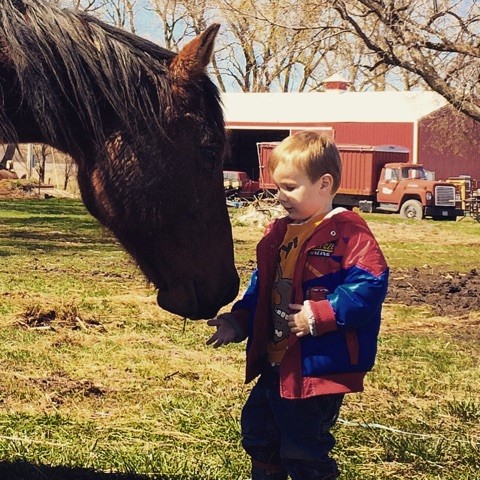 It’s always something. This time, it’s our twenty-three-year-old horse Red, who has developed severe allergies and has what is called “heaves” in horses, or COPD in humans. The symptoms are a deep cough, difficulty breathing so you see his sides “heave” in and out with each breath (hence, the name “heaves”), lack of appetite or interest in eating, which contributes to weight loss, and lethargy. It’s been less than six months since Red came to live with us, and he was such a lively, spooky, fat, healthy horse that it is really sad to see him in his current condition.
It’s always something. This time, it’s our twenty-three-year-old horse Red, who has developed severe allergies and has what is called “heaves” in horses, or COPD in humans. The symptoms are a deep cough, difficulty breathing so you see his sides “heave” in and out with each breath (hence, the name “heaves”), lack of appetite or interest in eating, which contributes to weight loss, and lethargy. It’s been less than six months since Red came to live with us, and he was such a lively, spooky, fat, healthy horse that it is really sad to see him in his current condition.
Red was born on our ranch in Nebraska, when I was a kid. He grew up in a dry, sandy climate, usually on dry sparse pasture, and was always in good health, even without daily grain. He was my brother Kris’ horse by default, but my dad really liked him for working cattle, and Red got to be a really good ranch horse because he got ridden a lot and had a natural athleticism and work ethic for cattle. When Dad sold the ranch and moved to Idaho in 2003, Red went with them. He still drove cattle, worked calves, and remained one of their solid using horses for the next twelve years. In Idaho, he lived mostly on irrigated pasture with alfalfa/grass mix, and gained a lot of weight. When Dad and Mom brought him to Iowa last October, he was actually a little overweight, and in great shape as far as general health. Dad cautioned that Red would develop a cough if fed moldy hay, but we didn’t worry about him too much at that point.
We noticed right away that Red didn’t like our Iowa hay. He wouldn’t even eat much of a small square bale of “good” alfalfa. Nothing was good enough, since he had come from a dairy grade alfalfa ranch. So we fed him a lot of grain, hoping to keep weight on him. After a month or two, we heard the cough, and by January he was exhibiting weight loss and a line along his lower rib cage that showed muscle developed from having to “heave” to get a breath. I took him to the vet February 8, along with Penny when she cut her leg, and the vet confirmed he had chronic allergies where his respiratory system was inflamed and swollen to the point of being nearly closed. He said there are a few treatments we could try, including shots, antihistamines, and herbal supplements. At that point he was eating fairly well, so I wasn’t too worried about him. I told the vet we were feeding him alfalfa hay, oats and corn mixed, and senior pelleted feed, and he said just keep doing what we were doing.
 Well, in March when green grass started to grow, we noticed Red wasn’t really eating much hay, and when we turned him out to graze, he would graze for awhile, but then after fifteen or twenty minutes would just stand there stiffly, with a lethargic look to him. We figured he was having to work so hard to catch his breath that he couldn’t comfortably graze at the same time. So again, we took him to the vet, who prescribed Tri Hist, which is an antihistamine/decongestant that should help shrink the tissue in his trachea and provide more room for air to pass through. For the first couple of days, when mixing the medicine (which is in a tiny granule form with cornmeal as a base) in with Red’s grain, he wouldn’t touch the grain. It just sat in his feed dish all day. This was a big concern, because of how little hay he was eating, the grain was a very important part of his diet. I bought bagged alfalfa pellets and soaked them according to directions. Red wouldn’t even nibble at them, he seemed completely turned off by them (but my other horses gobbled them up when I offered Red’s rejected feed dish to them—go figure!) So I tried mixing corn (which Red loves) with oats and the alfalfa pellets, and wetting it down just a little, then sprinkling the Tri Hist in so it sticks to the damp grain. And, after all those attempts, Red is finally eating it! He nibbles slowly at it throughout the day, rather than gobbling it all up like a healthy horse would, but I’m just happy that he’s finally eating.
Well, in March when green grass started to grow, we noticed Red wasn’t really eating much hay, and when we turned him out to graze, he would graze for awhile, but then after fifteen or twenty minutes would just stand there stiffly, with a lethargic look to him. We figured he was having to work so hard to catch his breath that he couldn’t comfortably graze at the same time. So again, we took him to the vet, who prescribed Tri Hist, which is an antihistamine/decongestant that should help shrink the tissue in his trachea and provide more room for air to pass through. For the first couple of days, when mixing the medicine (which is in a tiny granule form with cornmeal as a base) in with Red’s grain, he wouldn’t touch the grain. It just sat in his feed dish all day. This was a big concern, because of how little hay he was eating, the grain was a very important part of his diet. I bought bagged alfalfa pellets and soaked them according to directions. Red wouldn’t even nibble at them, he seemed completely turned off by them (but my other horses gobbled them up when I offered Red’s rejected feed dish to them—go figure!) So I tried mixing corn (which Red loves) with oats and the alfalfa pellets, and wetting it down just a little, then sprinkling the Tri Hist in so it sticks to the damp grain. And, after all those attempts, Red is finally eating it! He nibbles slowly at it throughout the day, rather than gobbling it all up like a healthy horse would, but I’m just happy that he’s finally eating.
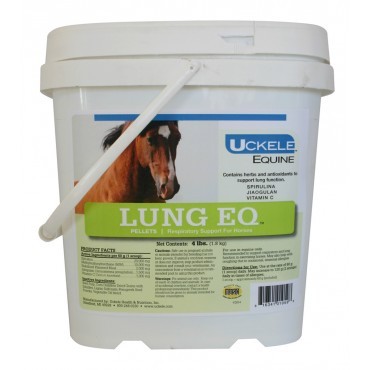 I also have ordered some herbal supplements called Lung-Eq, which is an equine respiratory support supplement for horses with exaggerated reactions to seasonal environmental irritants and allergens. It was on backorder and hasn’t come yet, so I’m not sure if it will have an effect on his allergies, or if he’ll even eat it.
I also have ordered some herbal supplements called Lung-Eq, which is an equine respiratory support supplement for horses with exaggerated reactions to seasonal environmental irritants and allergens. It was on backorder and hasn’t come yet, so I’m not sure if it will have an effect on his allergies, or if he’ll even eat it.
Sadly, what we have determined to be the unavoidable truth, is that Red will not be healthy here in Iowa, and our plans for him to be a good kids horse for our family are not going to work out. My dad agreed to take him back, since they have irrigated pasture and clean hay, and will either keep him or find a good home for him to live out the rest of his years. We are sad to not be able to keep Red, but his quality of life here would not be as good as it could be out West in a better climate.
This is Red, taken today, April 21, 2016:
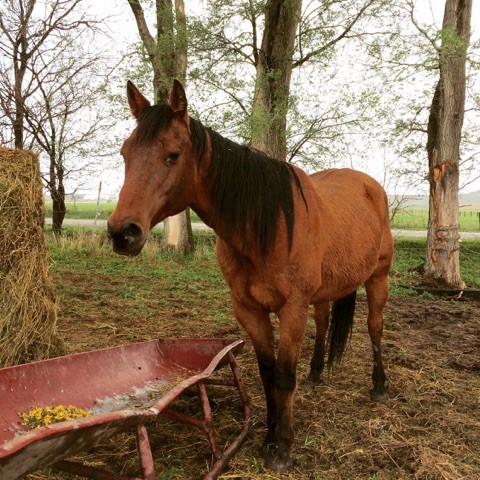
This was Red, back in October when he first came to Iowa: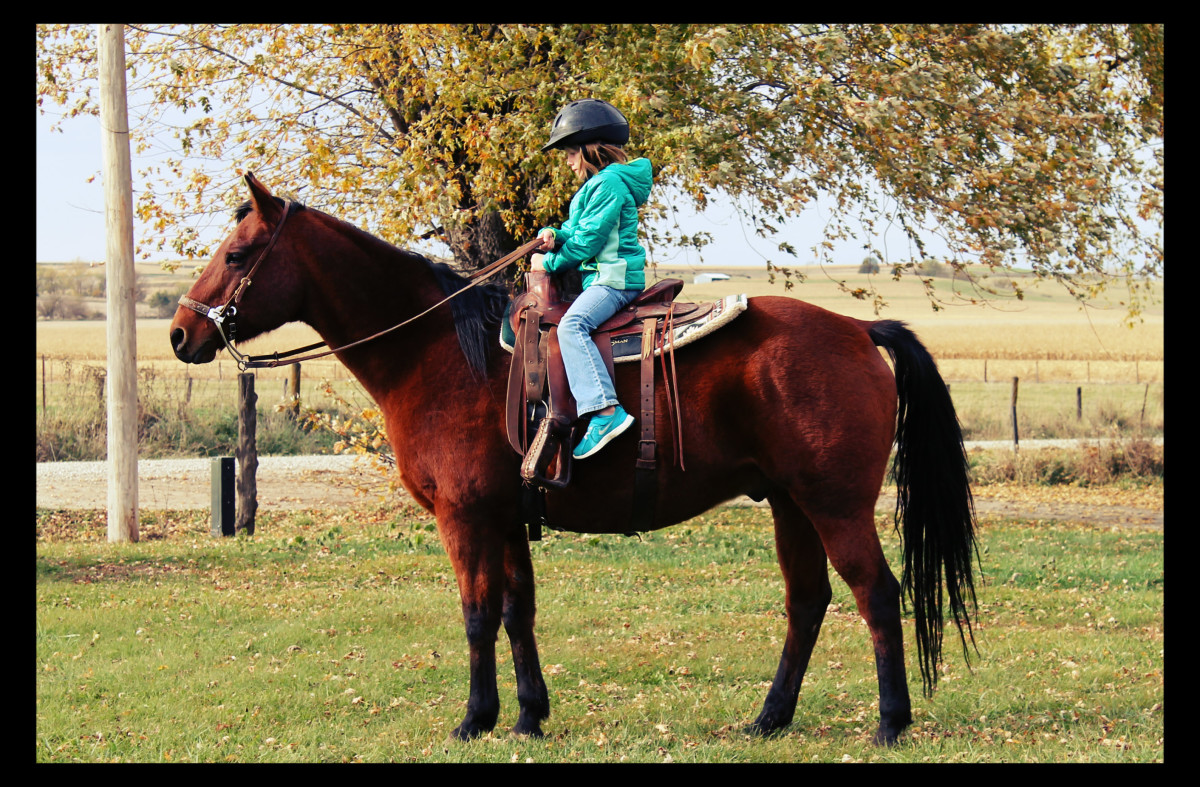
And this was Red, in Idaho at my little sister’s September wedding, carrying the groom: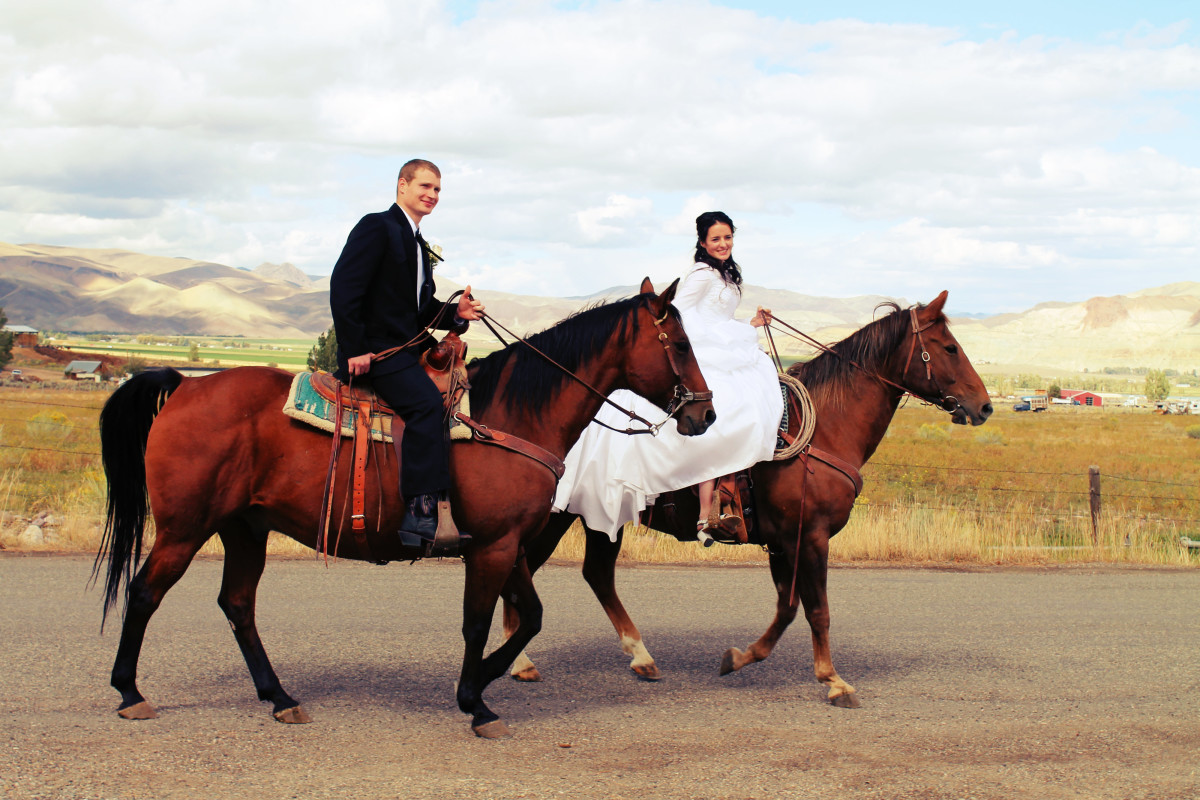 Red, carrying our son Jack, in Idaho June of 2014:
Red, carrying our son Jack, in Idaho June of 2014:
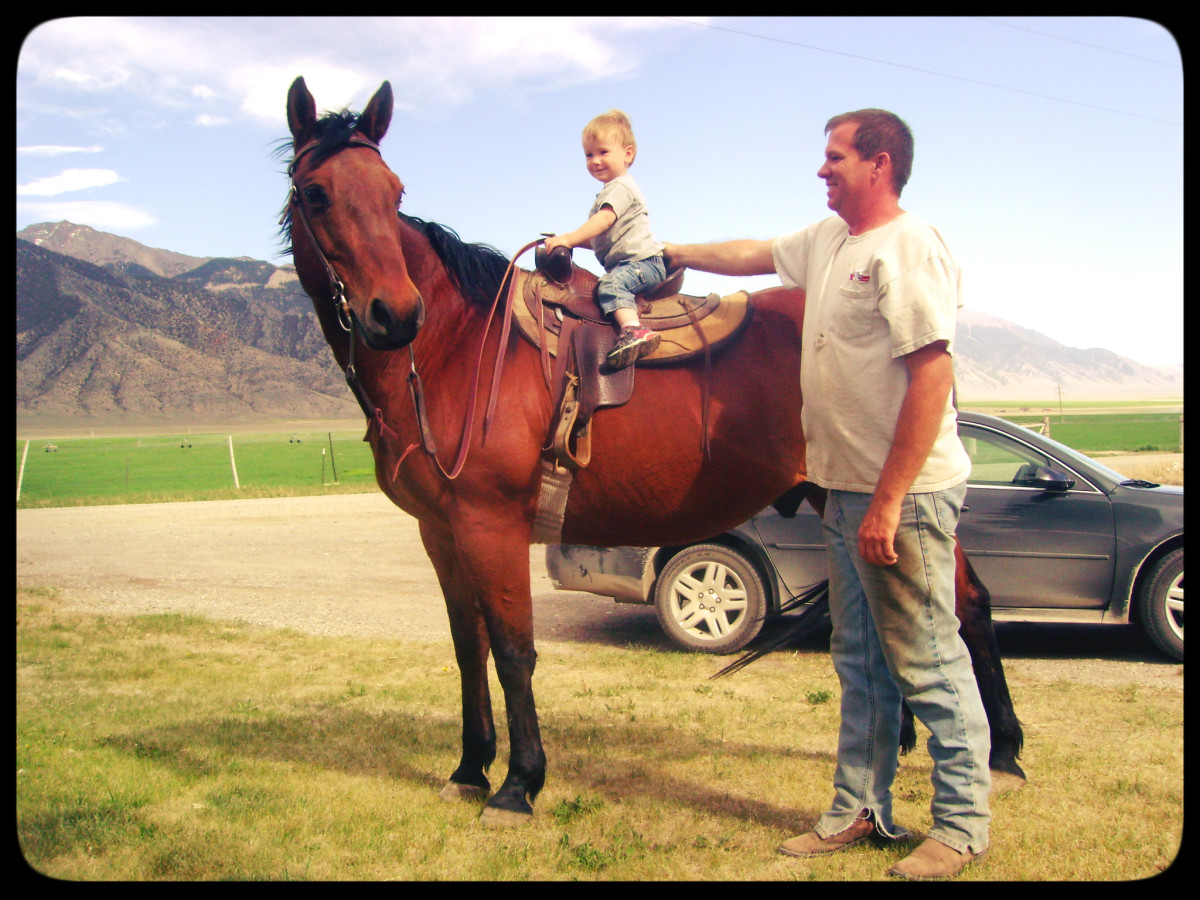 Cowboy Dad riding Red to work cattle in 2013:
Cowboy Dad riding Red to work cattle in 2013:
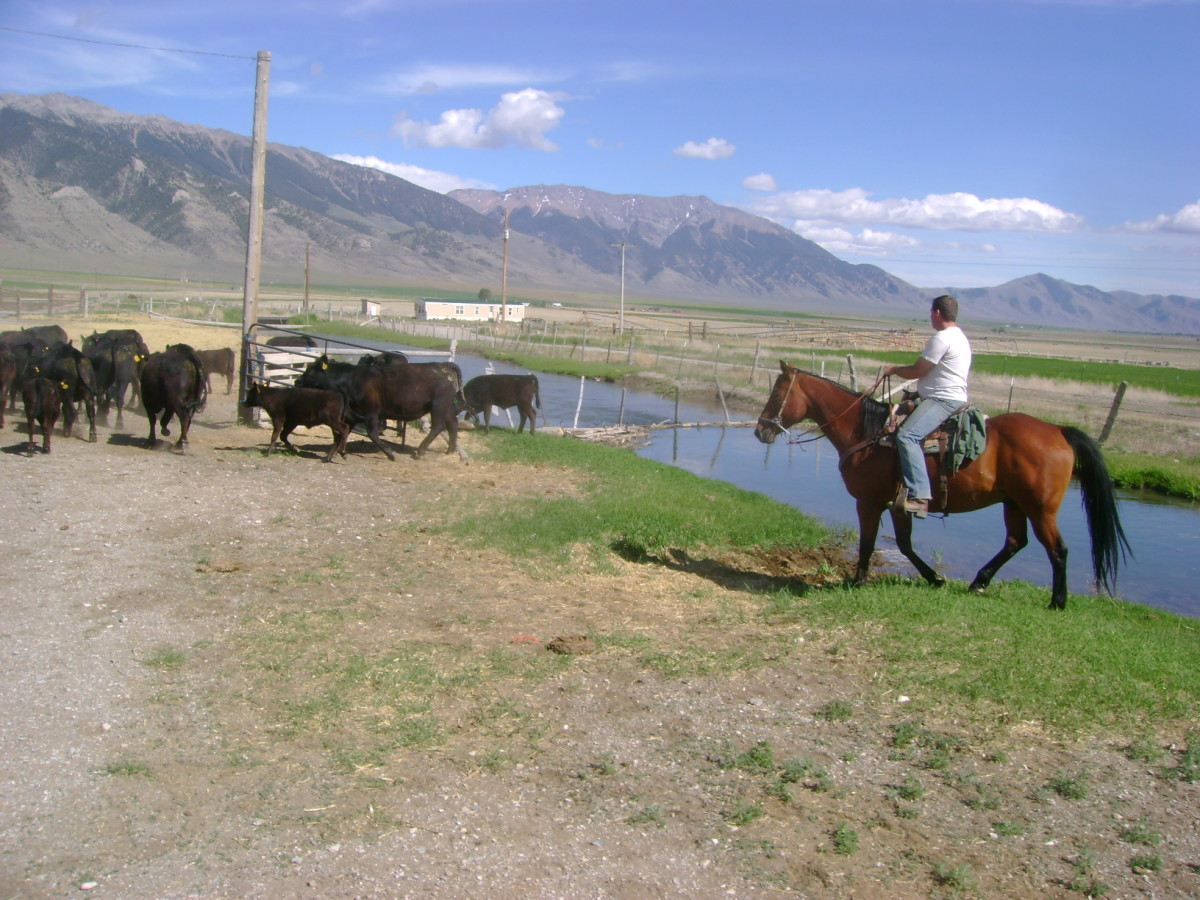
And my dad riding Red on a Pass Creek Cattle drive in 2011:
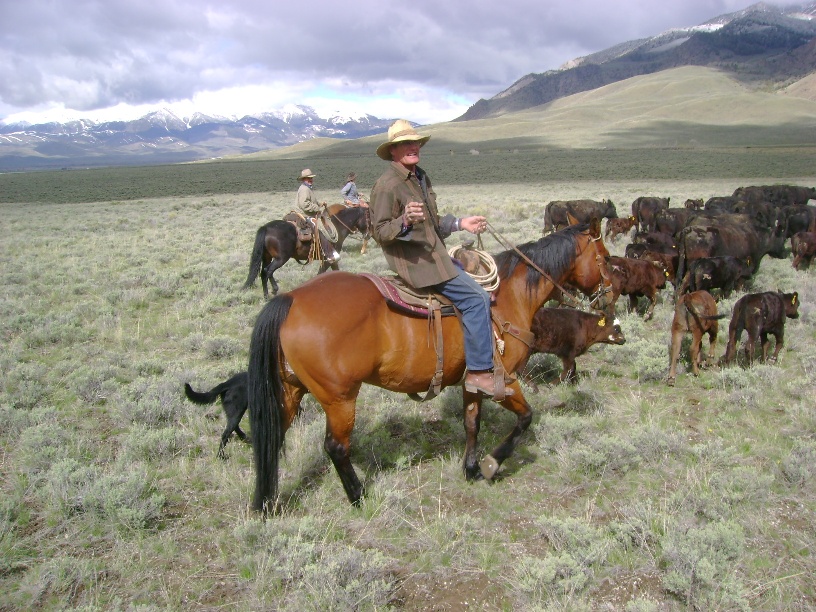 We will be taking him back to the mountains as soon as possible, so he can get healthy again!
We will be taking him back to the mountains as soon as possible, so he can get healthy again!

{ 2 comments }
Did Red go from being a horse that lived in a pasture out West to being one that lived in a barn in Iowa? That can sometimes cause respiratory problems. Also, giving vaccinations. If you suddenly vaccinated him, when he hadn’t had them before? Just some thoughts. Hope it gets worked out and he gets healthy.
Thanks, Cathy. Yes, he was used to either irrigated pasture (alfalfa/grass mix) or else very high quality alfalfa hay with no hint of mold. Then he came here and although we gave him the best we could find (small squares of alfalfa stored inside, but it was stemmy and not as lush and leafy as he was used to), and tried alfalfa pellets, which he wouldn’t eat…he lived mainly on grain here, which was a big dietary shift. He picked at his grain, ate very little hay, and lost weight and started heaving (standing still with nostrils flared, sides panting in and out with each breath). He lost his whinny, it just was an airy squeak, poor boy. We took him back to Idaho and he was on irrigated grass pasture. They said he was doing better, trotting around after their mares, but just after Memorial Day he colicked and died. We are very sad he is gone. He was such a good cow horse who dedicated his whole life to working on the ranch and having such a great attitude under saddle….he will be missed.